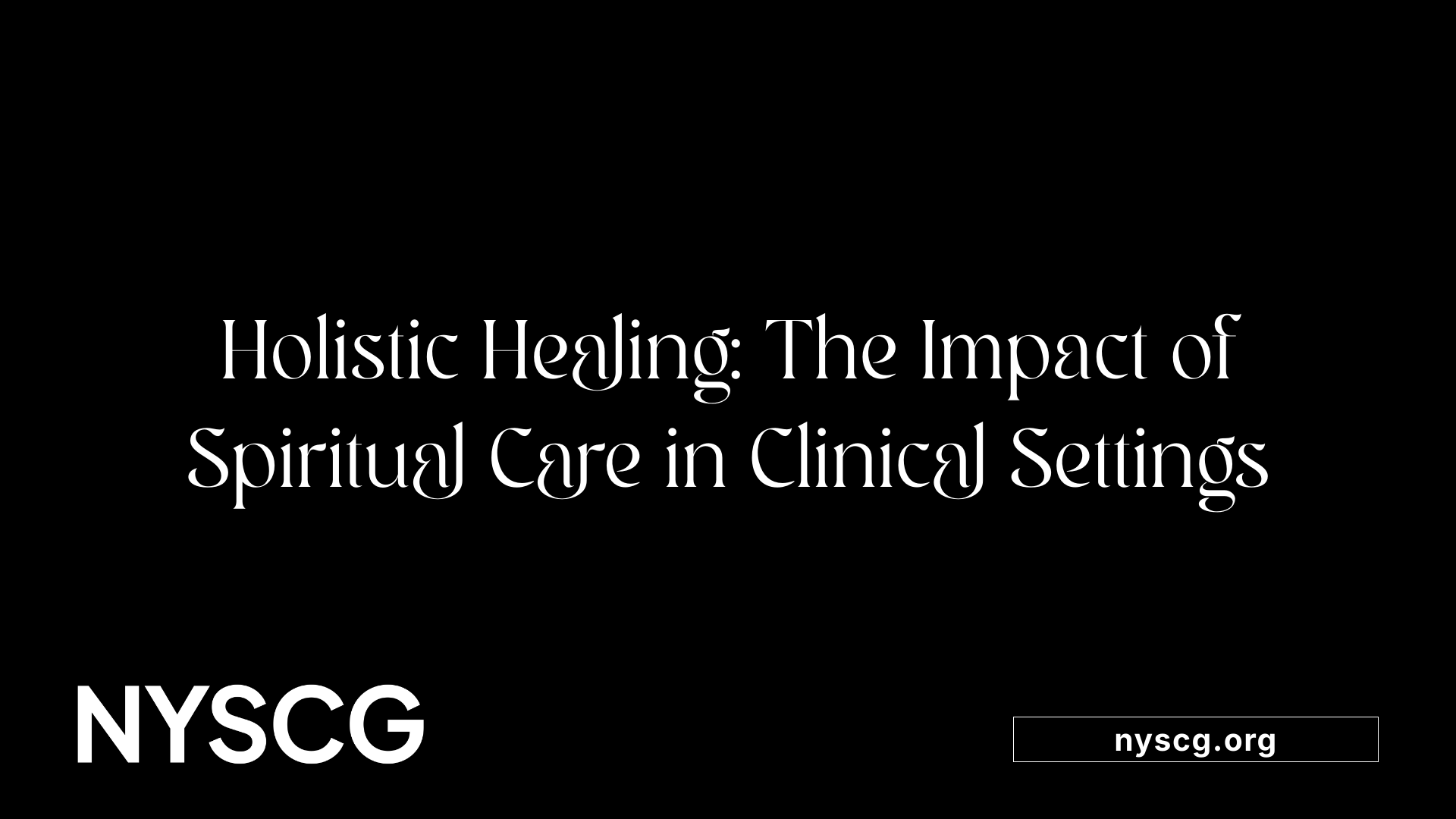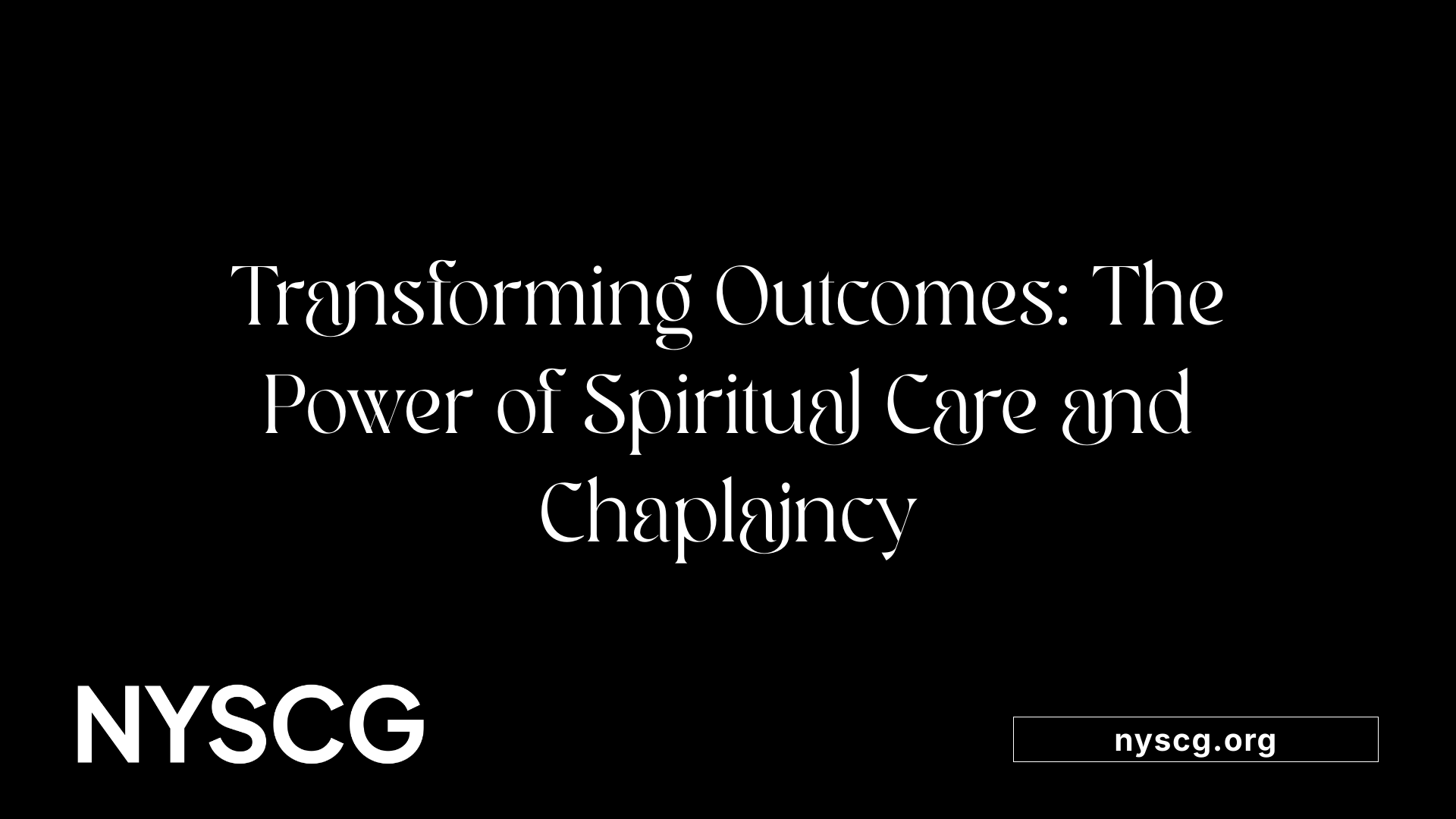Hospital Chaplains and Interdisciplinary Medical Rounds


Hospital chaplains are increasingly recognized as vital members of the healthcare team, especially during interdisciplinary medical rounds. Their unique expertise in spiritual assessment and support complements clinical care, fostering holistic healing and enhancing patient outcomes. This article explores how chaplains integrate into healthcare teams, support seriously ill patients, and contribute to improved clinical practices and patient satisfaction.

Hospital chaplains are essential members of the healthcare team, especially during interdisciplinary rounds. Their main focus is to provide spiritual assessments for patients, which include understanding religious beliefs, cultural backgrounds, and spiritual needs. These insights help medical staff deliver holistic care that respects patients' values and personal faith traditions.
Chaplains participate actively in goals-of-care discussions, offering support to patients and families facing complex decisions, especially in critical or end-of-life situations. They help clarify patients’ spiritual concerns and mediate conflicts that might arise between medical recommendations and personal beliefs.
Beyond individual patient interactions, chaplains support healthcare providers by offering emotional and spiritual resources. They assist staff in coping with the emotional stresses of their work, helping to prevent burnout and foster compassionate communication.
Chaplain-led services include facilitating religious rituals, prayers, and connecting patients with their faith communities. This helps honor cultural and religious sensitivities, contributing to respectful, personalized care.
In context, chaplains serve as bridges between the medical and spiritual worlds. They help translate clinical information into meaningful spiritual terms and advocate for patients' spiritual needs within the medical team.
Their presence during rounds ensures that spiritual considerations are integrated into overall treatment planning, promoting a more empathetic and comprehensive approach to care.
Ultimately, hospital chaplains support patients’ emotional and spiritual well-being, assist in navigating ethical and cultural issues, and contribute to a holistic, patient-centered healthcare experience.

Spiritual care delivered by hospital chaplains plays an indispensable role in supporting the complete well-being of patients. By addressing not only physical health but also emotional, social, and spiritual needs, chaplains help patients find meaning and purpose amidst illness and suffering. This comprehensive approach fosters comfort and hope, which can enhance a patient’s psychological resilience during difficult times.
Such spiritual care influences health outcomes beyond emotional support. Patients’ spiritual beliefs and practices can impact their medical decisions, coping mechanisms, and even physiological responses, leading to better overall health. Recognized by organizations like the Joint Commission, chaplains work within interdisciplinary teams to promote patient-centered and values-based care.
Furthermore, spiritual care fosters trust and builds meaningful connections between patients and caregivers. When medical providers acknowledge and support patients’ spiritual needs, it deepens trust, improves communication, and enhances satisfaction with care. Overall, the involvement of chaplains and spiritual care in clinical settings promotes a holistic sense of healing and well-being, improving quality of life and emotional resilience.

Spiritual care and chaplaincy play a crucial role in enhancing healthcare outcomes because they address more than just the physical needs of patients. They focus on the whole person—considering emotional, social, and spiritual dimensions—which fosters a sense of holistic healing.
When patients interact with chaplains or engage in spiritual practices, they often find a source of meaning and acceptance amid their health challenges. This emotional support helps reduce anxiety, alleviate fear, and improve overall quality of life. For example, students participating in hospital shadowing experiences recognized that spiritual care is essential, especially during end-of-life situations, and that chaplains provide broader support, including emotional relief for healthcare providers.
Research indicates that incorporating spiritual assessments and including chaplains in care teams can lead to better doctor-patient communication, increased trust, and decision-making aligned with patients’ values. This can improve satisfaction with care and contribute positively to recovery times, physical functioning, and even longevity.
Furthermore, clinicians who incorporate spiritual considerations often witness enhanced emotional resilience in patients, helping them cope better with illness. The involvement of spiritual care professionals supports a compassionate environment, making medical rounds more patient-centered and effective.
In summary, integrating spiritual care into routine healthcare fosters not only emotional well-being but also supports physical health, leading to improved recovery, patient satisfaction, and a more humane healthcare experience.

Hospital chaplains play an essential role in multidisciplinary care by actively participating in bedside rounds with healthcare professionals. During these rounds, they assess patients' spiritual and emotional needs, providing both counseling and advocacy.
Chaplains develop tailored spiritual care plans that respect individual beliefs and preferences. They often facilitate spiritual rituals, prayers, or rituals when appropriate, supporting patients' holistic well-being.
Beyond direct patient support, chaplains educate medical staff about spiritual issues, fostering a compassionate, person-centered approach. Their involvement helps address patients' existential and spiritual distress, which is especially crucial in critical care and end-of-life situations.
Chaplains serve as important liaisons, ensuring that spiritual considerations are incorporated into routine clinical discussions. They help coordinate referrals to faith communities or other support services, contributing to a more empathetic and comprehensive care environment.
This collaboration not only enhances patient dignity and respect but also reduces moral distress among healthcare providers. By integrating spiritual care into medical rounds, chaplains help cultivate an environment where emotional and spiritual health are prioritized alongside physical treatment.
Hospital chaplains play a vital role in supporting patients facing serious illness by conducting thorough spiritual assessments and providing tailored interventions. These efforts aim to address individual spiritual needs, alleviate distress, and promote a sense of peace and meaning. Chaplains utilize techniques such as reflective listening, prayer, and life reviews, offering comfort regardless of the patient's religious background or beliefs.
A common concern among seriously ill patients is the fear of death and feelings of grief or anger. Chaplains create safe, compassionate spaces for patients to express these emotions, helping them process complex feelings and find emotional solace. Their support extends beyond the individual, often involving families who may struggle with anticipatory grief or difficult medical decisions.
Collaboration with healthcare teams is essential. Chaplains participate in care planning, helping medical professionals understand and incorporate patients' spiritual needs. They also facilitate discussions around prognosis, medical options, and end-of-life choices, ensuring that spiritual considerations inform overall care strategies.
Supporting families is another key facet of chaplaincy. Chaplains assist loved ones in navigating grief, understanding complex medical information, and connecting with spiritual or community resources. This holistic approach fosters better decision-making and enhances overall well-being during challenging times.
Experience shows that integrating spiritual care into serious illness management improves patient satisfaction, reduces emotional distress, and promotes a more humane and holistic approach to treatment.
Hospital chaplains play a vital role in interdisciplinary healthcare teams by integrating spiritual and emotional support into overall patient care. They work closely with hospitals’ social workers, counselors, nurses, physicians, and hospice staff to address the spiritual needs of patients, especially in complex cases such as terminal illness or critical care.
Chaplains actively participate in ethical deliberations, offering insights into spiritual and ethical considerations that influence medical decisions. They often contribute to developing healthcare policies that foster holistic, patient-centered care environments.
Furthermore, chaplains are involved in training and educating healthcare staff on cultural competence, communication skills, and recognizing spiritual distress. This ongoing professional development promotes a shared understanding of the importance of holistic care and helps integrate chaplains more effectively into care teams.
Developing a common professional identity and engaging in interprofessional education sessions facilitate stronger collaboration. These efforts cultivate mutual respect and clear roles among team members, which is especially crucial given the often unclear or varying perceptions of chaplaincy.
Chaplains serve as resource persons during ethical discussions, such as end-of-life care and advanced directives, providing guidance on spiritual implications. They also support staff emotionally during stressful or morally challenging situations, enhancing team resilience.
Overall, when chaplains collaborate effectively with other healthcare professionals, the benefits extend beyond patient satisfaction to include improved treatment outcomes, enhanced staff well-being, and the delivery of truly comprehensive care.
Hospitals are increasingly recognizing the importance of integrating spiritual care provided by chaplains into their healthcare teams. Strategies for implementing these interventions include embedding chaplains within interdisciplinary teams, offering services both in-person and remotely, and customizing care to meet individual patient needs.
One innovative approach is the use of virtual platforms, such as recorded conversations with loved ones (like the 'This is My Story' or TIMS initiative), which became especially valuable during COVID-19 visitor restrictions. These digital interventions help humanize patients, support emotional well-being, and facilitate communication when direct contact is limited.
The effectiveness of chaplain interventions is measured through patient satisfaction, quality-of-life improvements, and clinical outcomes. Studies show that patients receiving spiritual care often report higher levels of emotional support and overall satisfaction with their hospital experience. Some hospitals also observe better hospice enrollment rates, reduced moral distress among providers, and lower rates of rehospitalization.
Hospital quality metrics reflect these positive effects. Facilities with dedicated chaplaincy services tend to score higher on patient experience and recommendation ratings, contributing to better hospital reputation and patient loyalty.
A sample innovative program is the TIMS system at Johns Hopkins, where chaplains conduct recorded interviews with patients' loved ones. The resulting audio files are stored safely within the electronic medical records (EMR) system and are accessible to staff, helping to foster a more holistic approach to patient care.
While the evidence highlights promising benefits, standardized research to evaluate outpatient chaplaincy services remains limited. The ongoing challenge is to refine implementation models for broader, quantifiable outcomes. Still, current data supports the view that well-integrated chaplaincy programs enhance care quality, patient satisfaction, and emotional well-being, ultimately contributing to more compassionate healthcare delivery.
The integration of hospital chaplains into interdisciplinary medical rounds exemplifies a paradigm shift towards holistic, patient-centered care. Their role in addressing spiritual needs, supporting emotional resilience, and facilitating compassionate communication significantly enhances the quality of healthcare delivery. As hospitals continue to recognize the importance of spiritual care, models like interdisciplinary collaboration and innovative interventions such as TIMS demonstrate the tangible benefits for patients, families, and healthcare providers. Embracing chaplaincy as an essential component of the medical team is key to fostering healing that encompasses mind, body, and spirit, ultimately refining the art of medicine in modern healthcare settings.
All you need is the will to make the world a better place.
New York State chaplain group inc. is a tax deductible organization with a federal tax Id number 92-383-4921